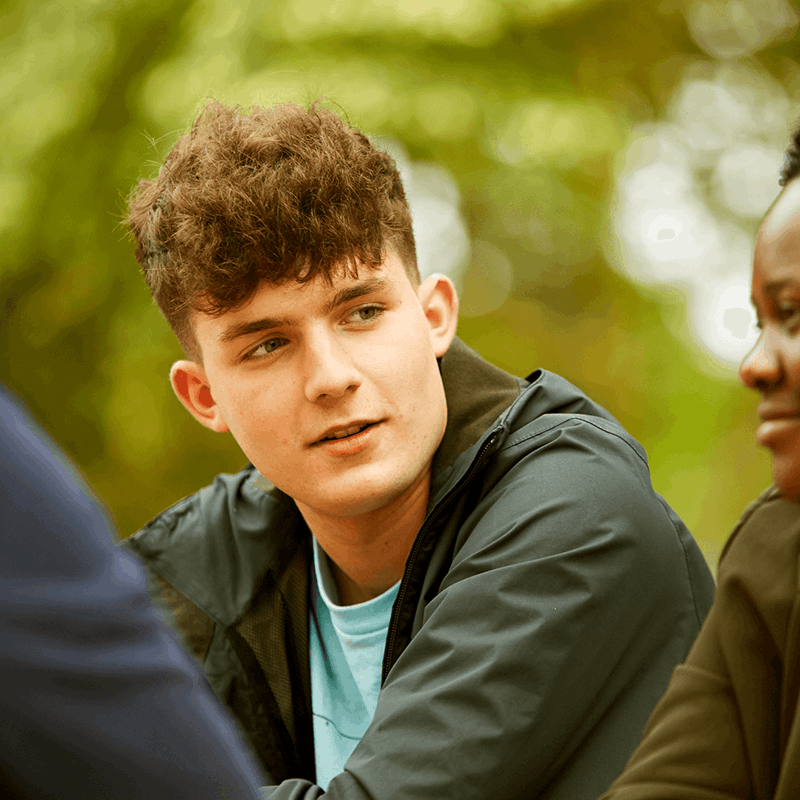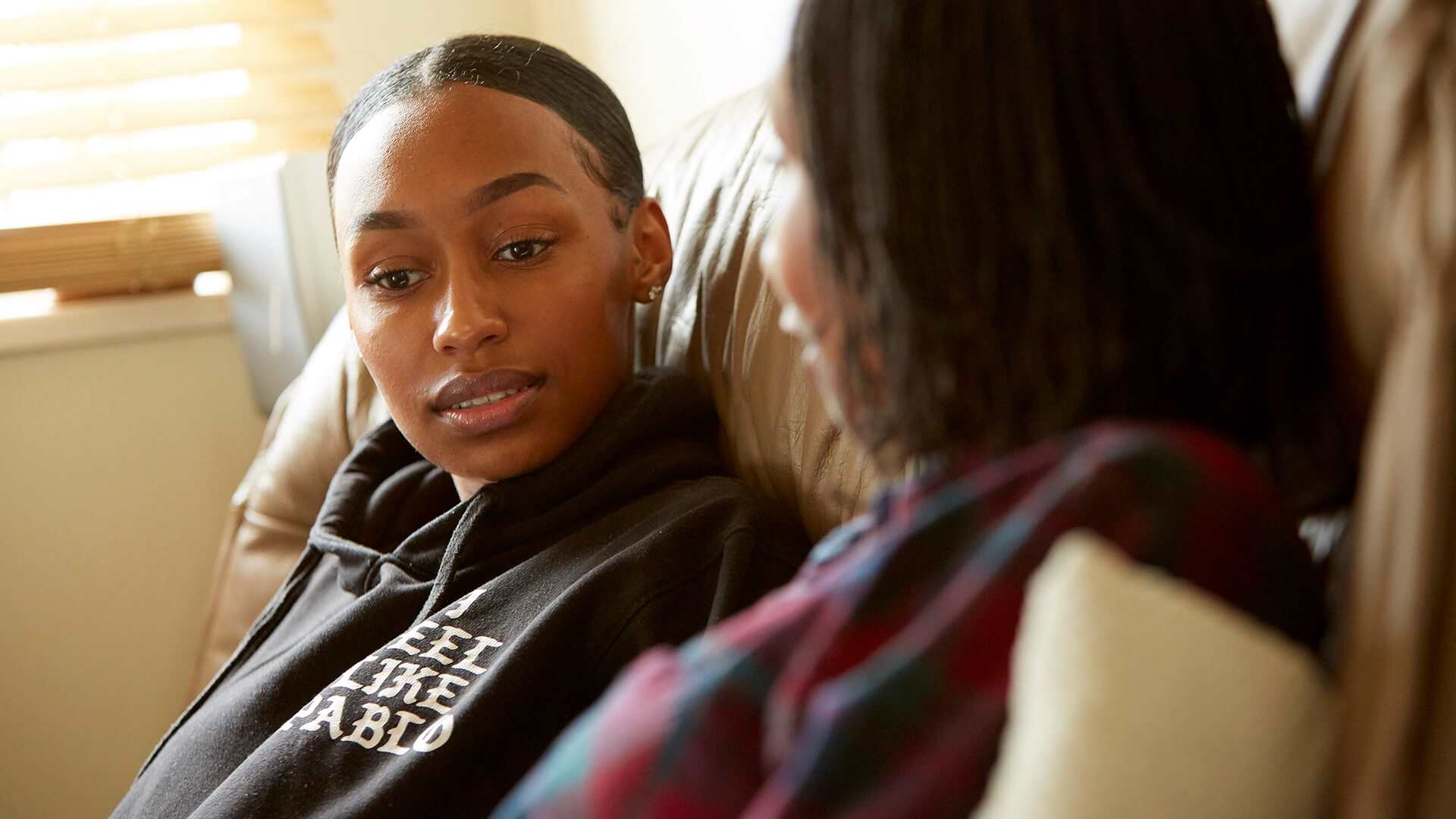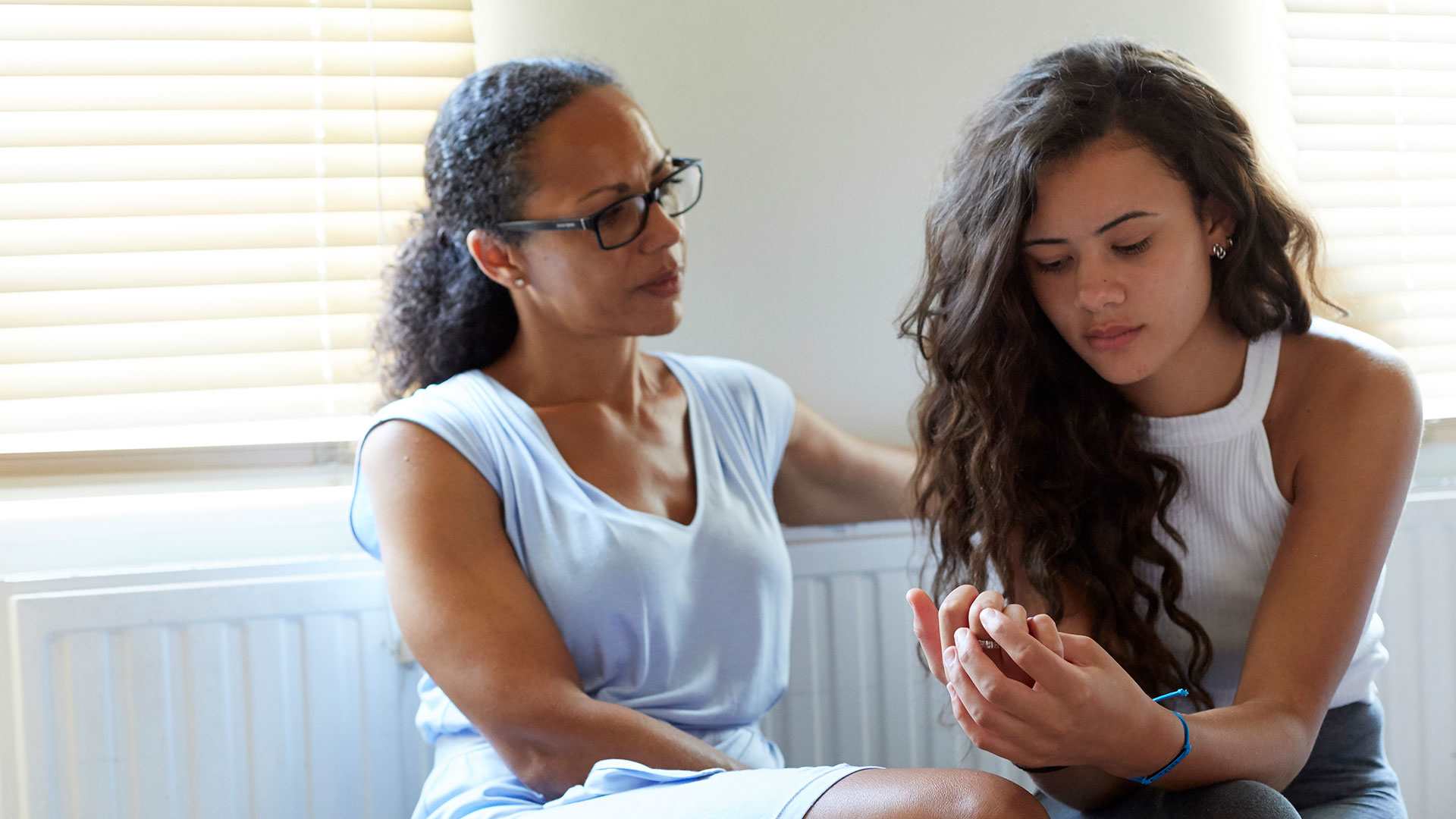What is CAMHS?
CAMHS stands for Child and Adolescent Mental Health Services. It’s the NHS service for children and young people’s mental health. Like other NHS services, it’s free to access.
CAMHS provides help such as talking therapies, medication, staying in hospital and parenting support.
The service offers support with a wide range of issues, including:
- anxiety
- depression
- self-harm
- challenging or violent behaviour
- eating disorders
- the effects of trauma
Some CAMHS also diagnose neurodivergent conditions such as autism and ADHD.
CAMHS teams include therapists, psychiatrists, psychologists, nurses and social workers. Our glossary explains the different roles.
You might hear this service called ‘CYPMHS’. This is a newer term that stands for Children and Young People’s Mental Health Services. On this page, we will use the term CAMHS .
How to get help from CAMHS
Each local area has its own CAMHS service. To get help from your local CAMHS, your child or young person will usually need to be referred by a professional. This is often done by a GP after a GP appointment. But you can also ask other professionals working with your child to refer them to CAMHS. This could be a:
- member of staff at school
- youth worker
- social worker
- counsellor or therapist
- health visitor
Some areas will accept self-referrals from young people and their parents. This means you can contact CAMHS yourselves, without a referral from a professional. Your local CAMHS service can tell you how referrals work in your area. To find them, go to your local CAMHS website or ask your GP or child's school for their contact details.
When asking for a referral to CAMHS, it can help to:
-
Give detailed information
Give the professional referring your child as much information as possible. Outline what you’re most concerned about. This might include the issues they’re experiencing, their symptoms and how long it’s been going on. Be clear about how this is affecting their daily life. Include school, learning, friendships, family relationships, eating and sleep.
-
Share opinions from other professionals
Ask other professionals to write a letter outlining what they’ve noticed. This could be their teacher, the school’s Special Educational Needs Coordinator (SENCO), the school nurse or another member of staff. Or it could be a counsellor, therapist or youth worker who’s already supporting your child. This will help to show CAMHS why your child needs help.
-
Check what happens next
Ask what the referral is for, where it’s going and how you’ll hear back. Get contact details for the service your child is being referred to, so you can follow-up. If you don’t hear anything after a few weeks, get in touch to find out when they’ll contact you.
You can use our resource to get ready for the appointment or meeting. This will help you think through what you want to say, so you’re more able to show the professional why your child needs a referral. If you’re struggling to get a referral, don’t give up. Ask the professional what other services can support your child if they don’t think CAMHS is the right one. Keep a log of what’s happening and go back again if you need to. If you disagree with their decision not to refer, try speaking to a different professional. For example, if a GP isn’t responding to your concerns, ask for an appointment with a different GP, or for a meeting with school instead.
Waiting lists for support from CAMHS can be long. This is worrying and frustrating for young people, and their parents or carers. Waiting times are also different in each local area. You can contact your local CAMHS to check that your child’s referral has arrived. You can also ask for an update on their waiting times.
If your child is on a waiting list, our guide tells you where else you can find help and how you can support them.
It’s helpful to be aware that the NHS does have guidelines for waiting times. This means that:
- young people experiencing psychosis should be seen within 2 weeks
- young people experiencing eating disorders should be seen within 4 weeks (or within 1 week if urgent, and within 24 hours in an emergency)
- no-one should wait more than 18 weeks for support after being assessed
In reality, these targets may sometimes be missed. But you might find it useful to be aware of them.
Always tell your GP and CAMHS if your child’s mental health gets worse while they’re on the waiting list. They may need to be seen more quickly. If your child is having a mental health crisis, or you’re worried they’re not safe, find out who to contact on our urgent help page.
I wanted help for my daughter immediately. I was shocked and frightened at having to wait a long time, as was she. Exploring resources and feeling we were doing something really helped us as parents to cope as well.
What to expect at a CAMHS assessment
The initial assessment will usually take place in your local CAMHS clinic. Sometimes, your child might be offered an assessment online via video call. You can request an interpreter if you or your child is not confident speaking English.
Depending on your child’s age and wishes, a professional may speak to you together or separately. If your child is 16 or over, the CAMHS team will ask your child if they want you to be present. It's sometimes easier for teenagers to talk without their parent there. So try not to take their decision personally if they want to speak on their own.
If your child is younger, they may also want to observe them while they play or do an activity.
- the difficulties your child is having and when they started
- the impact on your child’s daily life
- what their mood is like – for example, if they’re low, anxious or stressed
- any particular concerns, such as sleep or eating habits, self-harm or challenging behaviour
- what they were like when they were younger
- any difficult experiences in their life, such as bereavement, separation, bullying or abuse
- their medical history and any previous mental health issues
- what it’s like for them at school
- what their family life and friendships are like
- whether other professionals, such as school or social services, have already been involved
- whether you, or anyone else, is worried about their safety
- what you think might help
Preparing for a CAMHS assessment
Preparing can help make sure your child gets what they need out of the appointment. It can also support them to feel less worried about it.

To support your child before the appointment, it’s a good idea to:
-
Share information about what’s happening
Briefly explain why the appointment is happening and what to expect. Let them know how CAMHS might be able to help, and why you think it might make things better. Try to talk clearly, calmly and positively about it. Your child might like to read our blog written by a young person, which sets out what to expect.
-
Reassure them
Getting help and speaking to a new professional might feel hard for your child. Listen to any worries they have about seeing CAMHS or about how they’re feeling. Talk these through, focusing on listening rather than trying to ‘fix’ it straightaway. You can use our resource to help you think about the appointment and make some notes together.
-
Minimise stress on the day
Plan ahead of time how they’d like the appointment to be. Do they want you to go into the assessment with them, or speak to CAMHS separately? Is there anything they’d like you to say on their behalf, or are they comfortable talking? Where would they like you to wait? On the day, leave plenty of time for getting to the assessment and make sure you have all the paperwork you need.
Working with CAMHS
If your child does access help with CAMHS, there are things you can do to support the process:
-
Collaborate
Try to work in partnership with the professionals. Remember you all want the best outcome for your child.
-
Ask questions
If you don’t understand or agree about something, ask questions. Trust your instincts.
-
Take time for decisions
Don’t feel pressured into instant decisions. You and your child have the right to consider and agree to plans. Ask about alternatives if you aren’t sure.
-
Sum up plans
End meetings by summing up the plan and next steps if possible.
-
Keep notes
Write everything down, including professionals’ names and contact details. Confirm plans and strategies by email and request a response.
-
Give strategies time to work
Give the support and professionals a chance if something’s not working straightaway.
CAMHS services work with parents, carers and families, as well as young people. It’s always okay to ask questions and share your thoughts or concerns with the professionals. CAMHS should give you the name and contact details of your child’s key worker, so you can do this.
If your child is under 16, you will usually be invited to appointments to discuss their care. CAMHS will also try to respect your child or young person’s wishes about confidentiality. Try not to take it personally if there are some things your child doesn’t want to involve you in. Remember that having a private and independent space can be important. There will be certain situations in which CAMHS would not keep information confidential. For example, if they have concerns about their safety.
If your child is over 16, they have the right to make their own decisions about their care. This is the case unless professionals think they don't have the understanding or ability to do it. Your child can always ask for you to be involved or present at meetings when this feels helpful.
If you are unhappy with your child’s care, start by raising your concerns with the CAMHS team. You could request that your child sees a different professional. You can also ask them to provide an independent advocate for you or your child, if this is available.
Your local NHS Trust will also have a Patients Advisory Liaison Service (PALS), which can provide guidance around raising concerns and making complaints.
Young people tell us they would like their parents and carers to:
- be confident about asking questions of the professionals when necessary and using direct and straight language
- not give up on getting help
- listen and trust that their child knows how they feel
- describe what it’s like on the worst day – not just today or this week
- know their legal rights and the government's NICE guidelines
- remember they can attend appointments with their child
- stay calm and let their own emotions out somewhere else
- let their child know they’re proud of them for getting help
- be sensitive about escalating concerns

If CAMHS does not offer support
It can be upsetting, frustrating and worrying if CAMHS does not offer support . This might be because they don’t think your child meets the criteria or threshold for the service. Or because they think a different service can meet their needs better. You can ask CAMHS to explain their decision and reasons, and to put this in writing.
CAMHS should provide details for other organisations or services that could help instead. If you are unsure about how to get help from these services, ask CAMHS for more information, or talk to your GP.
Keep noting down any particular concerns you have about your child. This will help in the future if you need a professional to make another referral to CAMHS.
Here are some other ways you might be able to find help for your child:
Some schools provide a free counselling or emotional support service. Ask a member of staff at school to find out whether this is available. The school may also be able to provide support such as mentoring or help from the pastoral team. If your child is feeling anxious about school, we’ve got lots of advice in our guide for parents and carers.
There may be organisations near you offering free or low-cost support like:
- short-term counselling
- youth groups
- mentoring
- peer support groups
You can look for these by searching online. Or you can ask your child’s school or GP for a list of local services.
Local authorities run a service called Early Help. This supports children, young people and families with mental health and behaviour challenges. You can find out more about this in our guide for parents and carers.
Your local authority will also list all the local services for young people with SEND (Special Educational Needs and Disabilities) on their website. This is called the ‘Local Offer’. You can search for this online.
If it’s an affordable option for you, your child can get support from a private counsellor or therapist. Our guide for parents and carers tells you how to go about this. If your child is already being seen by CAMHS, or is on their waiting list, speak to them about this first. Sometimes, accessing private help might mean CAMHS support is withdrawn.
You can also use private services for assessments for conditions such as ADHD or autism. Before doing this, speak to your child’s school and your GP about the options. It’s important to make sure school and services will recognise the private diagnosis.
For advice about supporting your child at home, have a look at our A-Z mental health guide. This has information and tips for parents and carers about different mental health challenges.
If your child can’t engage with CAMHS
Sometimes, children and young people feel unsure about getting help. They might say they can’t or don’t want to. Or they might say no to appointments. This is very difficult for parents and carers. It can also make it hard for CAMHS professionals to offer support. Our video explains the steps you can take if your child is finding it difficult to access help.
If your child isn't getting help and you ever feel worried about their safety, find out who to contact now on our urgent help page.
Useful helplines and websites
While we take care to ensure that the organisations we signpost to provide high quality information and advice, we cannot take responsibility for any specific pieces of advice they may offer. We encourage parents and carers to always explore the website of a linked service or organisation to understand who they are and what support they offer before engaging with them.
-
YoungMinds Parents Helpline
We support parents and carers who are concerned about their child or young person's mental health. We can provide detailed information and advice, emotional support and signposting.
You can speak to us over the phone or chat to us online. When we’re closed, you can still leave us a message and we'll get back to you in 3-5 working days.
- Opening times:
- 9.30am-4pm on Mondays, Thursdays and Fridays; 9.30am-6pm on Tuesdays and Wednesdays
-
Youth Access
Provides information about local counselling and advice services for young people aged 11-25.
Put in your location and what you need help with into their 'Find help' search, and see what services are available in your area.

This page was reviewed in June 2025.
It was created with parents and carers with lived experience of supporting their child or young person around CAMHS.
We will next review the page in 2028.
YoungMinds is a proud member of PIF TICK – the UK's quality mark for trusted health information.
Whether you love the page or think something is missing, we appreciate your feedback. It all helps us to support more young people with their mental health.
Please be aware that this form isn’t a mental health support service. If your child is in crisis right now and you want to talk to someone urgently, find out who to contact on our urgent help page.
At YoungMinds we take your privacy seriously. If you’d like to read more about how we keep the information we collect safe, take a look at our privacy policy.


